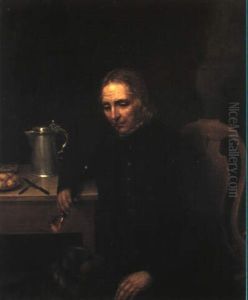Sophie Adlersparre Paintings
Sophie Adlersparre, born Sofia Adelaïde Charlotta von Adlerstam on July 6, 1823, in Ström parish, Västergötland, Sweden, was a notable figure in the 19th-century Swedish feminist movement, as well as a respected artist and publisher. She hailed from an aristocratic background, which provided her with the education and means to pursue her interests in art and social reform. Adlersparre was a pioneering advocate for women's rights in Sweden, dedicating much of her life to improving the status and education of women. Her contributions to the feminist movement are among her most enduring legacies.
Adlersparre's interest in art led her to become an accomplished painter, studying under various artists in Sweden and abroad. Although her artistic career was often overshadowed by her activism and publishing endeavors, she produced a number of works that were well-received in her time. Her art typically depicted scenes from Swedish life and history, rendered with a sensitivity and attention to detail that spoke of her deep connection to her homeland's cultural heritage.
Beyond her artistic achievements, Adlersparre's most significant impact was perhaps through her work as a publisher and writer. In 1859, she founded the periodical 'Tidskrift för hemmet' (Home Review) with her friend Rosalie Olivecrona. This publication was the first of its kind in Sweden to focus on women's issues, advocating for women's rights to education and work. Adlersparre also played a crucial role in establishing the Fredrika Bremer Association in 1884, named after the famous Swedish writer and feminist, which became a central organization in the Swedish women's movement.
Sophie Adlersparre's life was a testament to her commitment to social reform and her belief in the power of education and art to effect change. She passed away on June 27, 1895, in Stockholm, but her legacy lived on through the institutions she helped found and the shifts in Swedish society her advocacy helped bring about. Her work paved the way for future generations of women in Sweden and beyond, making her a revered figure in the history of feminism.



